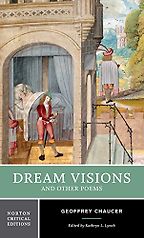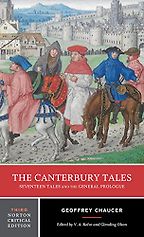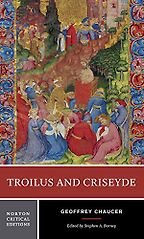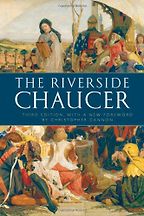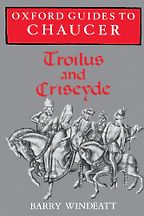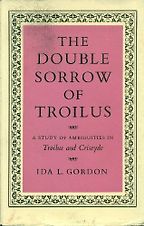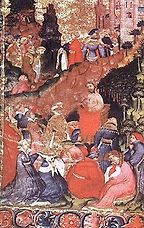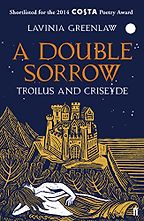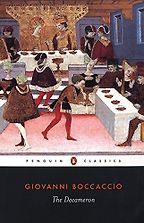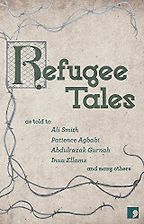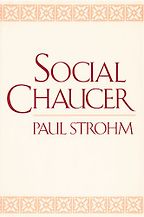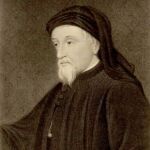
Books by Geoffrey Chaucer
Geoffrey Chaucer was a 14th-century poet who had a huge impact on English literature and whose books remain a staple for students studying it. Although traditionally dubbed “the father of English literature,” his poems are neither as hierarchical, nor as isolationist (or, indeed as boring!) as that title might suggest. He is one of the great comic poets in the English language.
If you’re looking for a biography of Chaucer, we recommend Chaucer: A European Life by Marion Turner, a professor of English at Oxford University. She spoke to us about Chaucer and his most famous work, The Canterbury Tales.
We also have an interview dedicated to Troilus and Criseyde, an earlier Chaucer poem, with the late Jenni Nuttall, who taught at Oxford and sadly died in January 2024. She describes Troilus and Criseyde as “an extraordinary piece of storytelling . . . one of the very greatest instances of moment-by-moment narration, of looking through different characters’ eyes: falling in love, being happy, betraying someone.”
“House of Fame is in fact my favourite Chaucerian text. It’s a crazy text. It’s unfinished—or seemingly unfinished. It’s a dream vision. It’s also the poem of Chaucer’s that seems to be the most autobiographical—though ‘seems’ is an important word there. The main character is called Geoffrey: he’s a writer, works as an accountant (as Chaucer did in the Customs Office), and then goes home at night to read books and try to write.” Read more...
The Canterbury Tales: A Reading List
Marion Turner, Biographer
The Canterbury Tales
by Geoffrey Chaucer
The Canterbury Tales is a funny and moving collection of fictional life stories, written in a language now known as Middle English in the 14th century. It's accessible to the modern reader, but can be a little hard to follow. If you'd like to read the stories, but don't have the time to get into the language, reading a modern translation—like poet, author and translator David Wright's The Canterbury Tales: A Prose Version in Modern English—is a good option.
“This edition contains the source—the springboard from which Chaucer is writing, Boccaccio—on facing pages in an English translation of the Italian. I like it because you can see where Chaucer is translating word by word. But there are also these wonderful moments where you get blank space on one side, and you realize Chaucer is expanding and inventing.” Read more...
Troilus and Criseyde by Geoffrey Chaucer: A Reading List
Jenni Nuttall, Literary Scholar
The Riverside Chaucer
by Geoffrey Chaucer
The Riverside Chaucer is the ideal book to get if you're ready for a volume of Chaucer's complete works. It contains all the Chaucer texts discussed on Five Books, as well as scholarly essays and commentary.
Interviews where books by Geoffrey Chaucer were recommended
-

1
Troilus and Criseyde
Geoffrey Chaucer (ed. by Stephen Barney) -

2
Oxford Guides to Chaucer: Troilus and Criseyde
by Barry Windeatt -

3
The Double Sorrow of Troilus: A Study of Ambiguities in ‘Troilus and Criseyde’
by Ida L. Gordon -

4
The Tragic Argument of Troilus and Criseyde
by Gerald Morgan -

5
A Double Sorrow: Troilus and Criseyde
by Lavinia Greenlaw
Troilus and Criseyde by Geoffrey Chaucer: A Reading List, recommended by Jenni Nuttall
Troilus and Criseyde by Geoffrey Chaucer: A Reading List, recommended by Jenni Nuttall
Troilus and Criseyde has a centuries’ old backstory. Long before Renaissance dramas or realist novels, Chaucer wrote a love story set in a besieged city that was a deep psychological exploration of character and human relationships. Jenni Nuttall, author of Troilus and Criseyde: A Reader’s Guide, shares her reading recommendations after over a decade of teaching the poem to Oxford undergraduates.
The Canterbury Tales: A Reading List, recommended by Marion Turner
Geoffrey Chaucer’s Canterbury Tales not only revolutionized English poetry—they’re also extremely funny and moving. Oxford Professor Marion Turner, who has written the first full-length biography of Chaucer in a generation, tells us about the extraordinary man who wrote them and why we should all read the Canterbury Tales.
